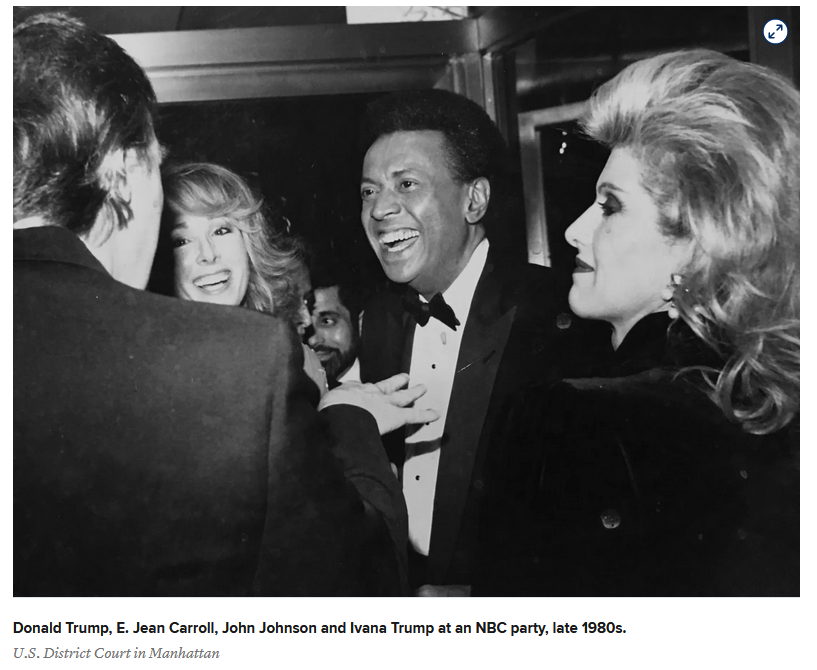-
Posts
1,722 -
Joined
-
Last visited
Content Type
Events
Forums
Downloads
Quizzes
Gallery
Blogs
Everything posted by Misty
-
Yes, by all means everyone VOTE! But until the primary system is retooled/revised, we may still have tyranny by the minority. In my state even though voting participation has been picking up, the primary system still results in the more moderate candidates being "primaried out" by extremist voters. Ranked Choice voting is needed. Then moderate politicians with the majority's support can win primaries and elections and we'll no longer have the crazy extremists in either party holding sway.
-
Agree with you - corporate profit over all else has been taught in MBA programs as almost a moral obligation. The Atlas Shrugged class have followed this mantra, without ever asking: Just what happens after "Atlas" shrugs? Certainly not a bright new dawn. Most will be worse off, maybe far worse off. Maybe even those who think of themselves as "Atlas" will not like what happens next. I think it is right for the US President to ask. But it would be naive to expect that merely asking will produce any real change. Much more is needed.
-

LTR and the 800,000 Baht Bank Account
Misty replied to HerewardtheWake's topic in Thai Visas, Residency, and Work Permits
My understanding is no. The BoI has been described to me as "having magical powers." -

LTR and the 800,000 Baht Bank Account
Misty replied to HerewardtheWake's topic in Thai Visas, Residency, and Work Permits
Unlike an elite card, the LTR visa isn't purchased. You either qualify, or you don't. Elite card is a tourist visa. LTR visa is very different in many respects, importantly you can work with an LTR visa. -

LTR and the 800,000 Baht Bank Account
Misty replied to HerewardtheWake's topic in Thai Visas, Residency, and Work Permits
Once the BoI has approved a new LTR visa, it will facilitate the transfer. Under BoI direction, the Immigration office colocated with the BoI cancels the existing NonO and issues the new LTR visa on the same day/same visit. -

LTR and the 800,000 Baht Bank Account
Misty replied to HerewardtheWake's topic in Thai Visas, Residency, and Work Permits
Actually it's not a new term for old visas. It's a new type of visa. Thailand's Board of Investment has offered it since 1 Sep 2022 : https://ltr.boi.go.th/ -

Donald Trump raped me, writer E Jean Carroll testifies in New York court
Misty replied to onthedarkside's topic in World News
Interestingly when shown a picture of him with the rape accuser "he never had seen before" he claimed the woman in the picture was his wife, Marla Maples. Not his type? https://www.cnbc.com/2023/01/19/trump-believed-rape-accuser-e-jean-carroll-was-wife-in-photo.html -

Non-B Visa, work permit & property purchase
Misty replied to Phxdiver's topic in Thai Visas, Residency, and Work Permits
Yes, it's very important for US citizens to understand their US reporting & filing requirements if they own a foreign company. Used to be relatively simple, but the "Tax Cuts and Jobs Act 2017" added over 100 pages of filing to my annual US 1040 taxes - simply because I own a Thai Amity treaty company. The new 5471 and its seeminly endless schedules are not for the feint of heart. Professional tax advice is required. -

Non-B Visa, work permit & property purchase
Misty replied to Phxdiver's topic in Thai Visas, Residency, and Work Permits
The US-Thai Amity Treaty was signed in 1966 to allow US and Thai citizens to go to each other's countries for the purpose of investment and business. Today US citizens can apply under the treaty to own Thai businesses 100%. An Amity treaty company can't own landed property, however. -

Cat killing competition for children in New Zealand axed after backlash
Misty replied to Social Media's topic in World News
Doesn't seem like a good game for children, however -

Oklahoma officials accused of talk of killing journalists
Misty replied to onthedarkside's topic in World News
So it seems they're not "just good old boys, never meaning no harm" -

Trump has pleaded not guilty to 34 counts of falsifying business records
Misty replied to Scott's topic in World News
Yes, the wheels of justice do roll slowly. But the tide is turning now. Hope you are ready. -

Trump has pleaded not guilty to 34 counts of falsifying business records
Misty replied to Scott's topic in World News
Get ready for it. "As of November 2022, Donald Trump has been credibly accused of committing at least 56 criminal offenses since he launched his campaign for president in 2015. That total only reflects allegations relating to his time in or running for office and omits, for instance, Trump’s criminal exposure for fraudulent business dealings. " https://www.citizensforethics.org/reports-investigations/crew-reports/president-trumps-staggering-record-of-uncharged-crimes/ -

Trump has pleaded not guilty to 34 counts of falsifying business records
Misty replied to Scott's topic in World News
Lily-white, he is not. "According to a 2016 USA Today analysis, Donald Trump and his businesses were involved in 3,500 legal cases in U.S. federal and state courts during the previous three decades, an unprecedented number for a U.S. presidential candidate. Of the 3,500 suits, Trump or one of his companies were plaintiffs in 1,900; defendants in 1,450; and bankruptcy, third party, or other in 150.[1] Trump was named in at least 169 suits in federal court.[2] In the 1,300 cases where the record establishes the outcome, Trump settled 175 times, lost 38, won 450, and had another 137 cases end with some other outcome. In the other 500 cases, the cases were dismissed.[1] In 2016, Trump was elected as U.S. President. Numerous legal affairs persisted during and after his presidency. For example, between October 2021 and July 2022 alone, the Republican National Committee paid more than $2 million to attorneys representing Trump in his capacity as President and in his personal and business capacities.[3]" https://en.wikipedia.org/wiki/Legal_affairs_of_Donald_Trump -

Rupert Murdoch Can Be Forced to Testify in Defamation Trial, Judge Says
Misty replied to onthedarkside's topic in World News
There's no doubt that the primary system is messed up. Trump could win his party's nomination in 2024, despite all the headwinds, criminal cases, etc. If he does, it won't be because Trump is "popular". Make no mistake, Biden won both the electoral and the popular vote in 2020, and has a wide following among moderates. "Joe Biden defeated Donald Trump 306-232 in the Electoral College and had a 4-point margin in the popular vote." https://www.pewresearch.org/politics/2021/06/30/behind-bidens-2020-victory/ -

Trump has pleaded not guilty to 34 counts of falsifying business records
Misty replied to Scott's topic in World News
Didn't bother? More like DOJ under Bill Barr directly interfered in the case, preventing it from going anywhere. Barr acted as if he was Trump's personal lawyer. https://www.washingtonpost.com/outlook/2022/09/09/former-us-attorney-dishes-how-he-held-line-against-trump-white-house/ "Barr’s tenure as attorney general, beginning in February 2019, made things even worse. In September of that year, Berman refused to sign the DOJ’s legal briefs in Trump’s subpoena battle with Manhattan District Attorney Cyrus Vance. Vance was investigating the role of Trump and the Trump Organization in payments made to Stormy Daniels and Karen McDougal shortly before the 2016 election. The DOJ was planning to file a statement of interest containing the audacious argument that a sitting president could not be criminally investigated, a view the Supreme Court would later reject. Insisting that his office was not “Trump’s personal lawyer,” Berman refused to sign the statement of interest, but the DOJ persisted." -

Trump has pleaded not guilty to 34 counts of falsifying business records
Misty replied to Scott's topic in World News
yes who among us hasn't used campaign money to pay off porn stars and playboy bunnies and deducted it on our taxes?- 320 replies
-
- 10
-

-

-

-

-
Seems likely:
-
Some interesting reports on the donor, Harlan Crow
-
It's interesting to see how Justice Thomas describes the gift giver Harlan Crow and his wife as "dearest friends". What, I wonder, was the basis of this friendship? What was their shared experience that contributed to this great friendship?





